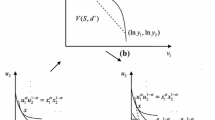Abstract
We generalize the well-known result of the coincidence of the bargaining set and the core for convex games (Maschler et al. 1972) to the class of games named almost-convex games, that is, coalitional games where all proper subgames are convex.
Similar content being viewed by others
References
Bondareva, O. N. (1963). Some applications of linear programming methods to the theory of cooperative games. Probl Kibern, 10, 119–139.
Borm, P., Fiestras-Janeiro, G., Hamers, H., Sánchez, E., & Voorneveld, M. (2002). On the convexity of games corresponding to sequencing situations with due dates. Eur J Oper Res, 136, 616–634.
Branzei, R., Tijs, S., & Zarzuelo, J. (2009). Convex multi-choice games: characterizations and monotonic allocation schemes. Eur J Oper Res, 198, 571–575.
Csóka, P., Herings, J. J., Kóczy, L. Á., & Pintér, M. (2011). Convex and exact games with non-transferable utility. Eur J Oper Res, 209, 57–62.
Davis, M., & Maschler, M. (1963). Existence of stable payoff configurations for cooperative games. Bull Am Soc, 69, 106–108.
Davis, M., & Maschler, M. (1967). Existence of stable payoff configurations for cooperative games. In M. Shubik (Ed.), Essays in mathematical economics in honor of Oskar Morgestern (pp. 39–52). Princeton: Princeton University Press.
Einy, E., & Wettstein, D. (1996). Equivalence between bargaining sets and the core of simple games. Int J Game Theory, 25, 65–71.
Einy, E., Holzman, R., Monderer, D., & Shitovitz, B. (1997). Core equivalence theorems for infinite convex games. J Econ Theory, 76, 1–12.
Granot, D. (2010). The reactive bargaining set for cooperative games. Int J Game Theory, 1, 73–93.
Gellekom, J. R. G., Potters, J. A. M., & Reijnierse, J. H. (1999). Prosperity properties of TU-games. Int J Game Theory, 28, 211–227.
Hamers, H. (1997). On the concavity of delivery games. Eur J Oper Res, 99, 445–458.
Hamers, H., Klijn, F., & van Velzen, B. (2005). On the convexity of precedence sequencing games. Ann Oper Res, 137, 161–175.
Izquierdo, J. M., & Rafels, C. (2001). Average monotonic cooperative games. Games Econ Behav, 36, 174–192.
Izquierdo, J. M., & Rafels, C. (2012). A characterization of convex TU games by means of the Mas-Colell bargaining set (à la Shimomura). Int J Game Theory, 41, 381–395.
Maschler, M., Peleg, B., & Shapley, S. (1972). The kernel and bargaining set for convex games. Int J Game Theory, 39, 163–170.
Mas-Colell, A. (1989). An equivalence theorem for a bargaining set. J Math Econ, 18, 129–139.
Meertens, M., Potters, J. A. M., & Reijnierse, J. H. (2007). On bargaining sets in symmetric games. Int Game Theory Rev, 9, 199–213.
Meggido, N. (1974). On the nonmonotonicity of the bargaining set, the kernel and the nucleolous of a game. SIAM J Appl Math, 27, 355–358.
Núñez, M., & Rafels, C. (1998). On extreme points of the core and reduced games. Ann Oper Res, 84, 121–133.
Potters, J. A. M., Poos, R., Tijs, S. H., & Muto, S. (1989). Clan games. Games Econ Behav, 1, 275–293.
Pulido, M., & Sánchez-Soriano, J. (2009). On the core, the Weber set and convexity in games with a priori unions. Eur J Oper Res, 193, 468–475.
Shapley, L. S. (1967). On balanced sets and cores. Nav Res Logist Q, 14, 453–460.
Shapley, L. S. (1971). Cores of convex games. Int J Game Theory, 1, 11–26.
Shimomura, K. (1997). Quasi-cores in bargaining sets. Int J Game Theory, 26, 283–302.
Solymosi, T. (1999). On the bargaining set, kernel and core of superadditive games. Int J Game Theory, 28, 229–240.
Solymosi, T. (2008). Bargaining sets and the core in partitioning games. Cent Eur J Oper Res, 16, 425–440.
Topkis, D. M. (1987). Activity optimization games with complementarity. Eur J Oper Res, 28, 358–368.
Vohra, R. (1991). An existence theorem for a bargaining set. J Math Econ, 20, 19–34.
Acknowledgements
Institutional support from Ministerio de Ciencia e Innovación and FEDER under grant ECO2011-22765, and Generalitat de Catalunya under grant 2009SGR0960 is acknowledged.
Author information
Authors and Affiliations
Corresponding author
Rights and permissions
About this article
Cite this article
Getán, J., Izquierdo, J.M., Montes, J. et al. The bargaining set for almost-convex games. Ann Oper Res 225, 83–89 (2015). https://doi.org/10.1007/s10479-012-1226-y
Published:
Issue Date:
DOI: https://doi.org/10.1007/s10479-012-1226-y




